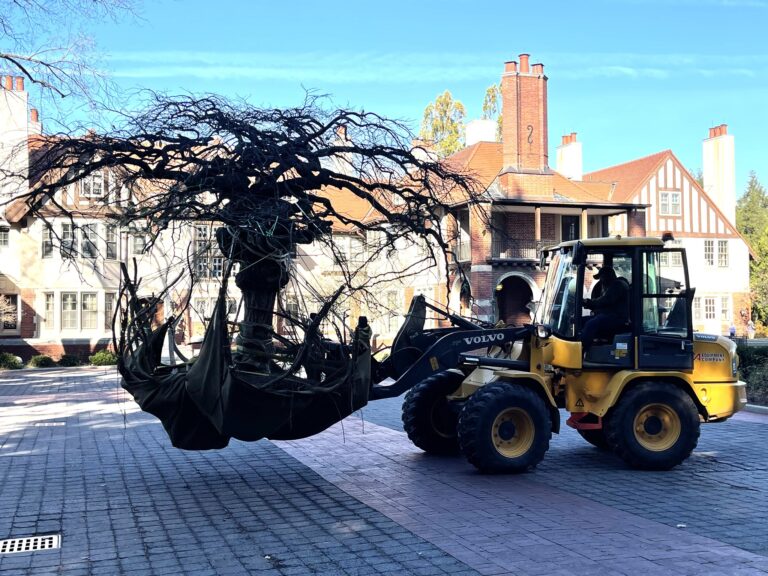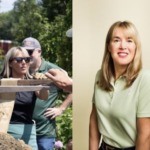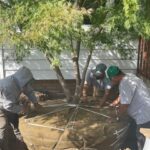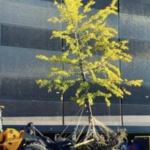
- Kim Kisner
- Community
- 01/07/2025
Aiming to Address Challenges of Landscaping Waste

RE-TREE is a for-profit digital marketplace designed to offer property owners a more responsible alternative to traditional healthy tree removal. The platform enables property owners to sell, relocate, or donate their trees, promoting sustainability and preservation.
Transplanting services supporting the marketplace are provided by a network of certified and trained contractors, ensuring professional and reliable execution. A detailed proposal for these services is presented to the buyer, approved, and collected by RE-TREE upon project completion.
In addition to transplanting services, RE-TREE offers plant healthcare solutions designed to enhance the growing environments of mature trees. These services focus on improving the health span of trees, ultimately contributing to their longer lifespan.
The marketplace operates as a virtuous cycle, with tailored approaches for residential and commercial property owners. A transaction fee applies to the appraised value of the tree:
- For residential property owners, fees range from 20-30%, depending on the appraised value of the tree.
- For commercial property owners, a flat 20% transaction fee is applied.
RE-TREE bridges the gap between environmental responsibility and practical solutions, creating value for both property owners and their communities.
SBN Detroit sat down with RE-TREE’s founder and CEO, Dennise Vidosh, to discuss the urban and suburban landscaping waste challenges in Southeast Michigan, the economic and environmental impact of saving mature trees, and how these efforts are contributing to broader climate action goals.

Q: What is the impetus behind RE-TREE?
A: As a little girl, I was deeply connected with nature, and I wanted to preserve the beautiful environment I grew up enjoying. My purpose materialized in 2018 with the innovative vision of preventing the unnecessary destruction of mature trees by developing a digital marketplace for their relocation. Through the power of technology, RE-TREE provides a platform for property owners to buy, sell, and relocate mature trees, turning a potential environmental loss into economic and ecological gain.
This initiative is a solution to a global issue, transforming private property landscaping practices and redefining urban sustainability. Our momentum is driven by two key forces: the era we’re living in—commonly referred to as the Anthropocene, where we are acutely aware of our impact on the environment— and the green industry’s growing capacity and enthusiasm to embrace innovation and prioritize ecological preservation, setting the stage for meaningful change.
Q: What are the current challenges facing Southeast Michigan in terms of managing urban and suburban landscaping waste, and how significant is the problem?
A: One major challenge is a lack of awareness—awareness that a responsible solution exists when a tree outgrows its space or is in the way of new construction.
Another challenge is perception. We’ve encountered some pushback from municipalities that don’t yet believe our tree preservation goals align with local ordinances. However, we’re actively working with these municipalities to find solutions, turning skeptics into our strongest advocates. Mature tree preservation is our mission, and while trees in commercial green spaces have historically followed a linear lifecycle, we’re making it cyclical to extend their lifespan and environmental contributions.
Q: How does the concept of replanting trees and bushes instead of discarding them align with broader sustainability goals?
A: Relocating mature trees rather than removing them aligns seamlessly with global sustainability goals. Mature trees provide exponential benefits to our planet, people, and communities. When healthy trees are removed simply because they’re in the way, all those benefits are lost.
RE-TREE connects the dots through technology, making it easy for property owners to take a more sustainable approach. Once a mature tree is cut down, we can never replace its ecological value by planting smaller, less mature trees. Protecting these trees ensures a continuous cycle of giving back to the environment.
Q: What are the environmental impacts of saving and replanting trees compared to traditional disposal methods?
A: Once we destroy a mature tree, we can never catch up to the value it provides—both now and in the future. Growing trees as an agricultural crop on open land isn’t sustainable either. Preserving existing mature trees ensures we maintain their current environmental benefits, which include carbon sequestration, oxygen production, cooling effects, reduced erosion, and providing habitats for biodiversity.
Q: What are the key requirements for a tree or bush to be successfully salvaged and replanted?
A: The tree must be free of damage or disease and accessible for responsible extraction. There must be no overhead wires obstructing its removal path, and it needs to be a certain distance from any structure, depending on its size. Generally, we work with trees under 12 inches in trunk diameter or 35 feet tall. Bonus points for unique shapes or styles!

Q: What are some of the biggest logistical or operational challenges in implementing a tree-replanting program?
A: Building a network of certified service providers is currently the most significant challenge. Attracting, training, and certifying contractors to move living organisms responsibly takes time.
The supply of trees will drive the demand and attract contractors, creating a new revenue stream for green industry professionals while enhancing their environmental stewardship. It’s a process of “build it, and they will come.” Together, we can build this supply chain and revolutionize the industry.
Q: What are the economic and environmental benefits for homeowners, developers, or municipalities who choose to salvage trees and bushes instead of removing and replacing them?
A: The benefits are immense. A mature tree sequesters eight times more carbon produces eight times more oxygen, and provides vital habitats for countless species, contributing significantly to biodiversity. These trees are invaluable to the planet’s ecosystem, and their preservation actively mitigates climate change impacts.
Municipalities can benefit from residents or businesses donating trees to local parks, while commercial property owners can transform their green spaces into revenue-generating assets. It creates a never-ending cycle of giving back, fostering community connection and shared environmental goals.
Q: How does preserving trees contribute to broader climate action goals, such as reducing greenhouse gas emissions or improving biodiversity in Southeast Michigan?
A: Preserving carbon sequestration benefits is the most immediate and obvious impact. By advising commercial property owners on native and diverse replacements for removed trees, we also reduce monocultures and create a hyper-local supply chain for trees, minimizing greenhouse gas emissions.
Q: What partnerships or collaborations are critical to scaling this type of operation in the region? Are there existing collaborations with environmental or municipal organizations?
A: Government and municipalities must encourage and incentivize property owners to adopt this new standard. Partnerships with national tree-transplanting organizations will also be critical for scaling the marketplace nationally and globally.
Q: Looking ahead, what do you see as the long-term potential for replanting and salvaging trees as a standard practice? How can the landscaping and construction industries be encouraged to adopt this model?
A: The future demands transformation for the health of both the planet and humanity. This shift must happen on private properties and within the green industry. To address this global challenge, we need to empower individuals and industries to think and act differently.

We stand at a pivotal moment where we can create the world’s largest urban tree nursery, collectively owned by the citizens of this planet. By preserving mature trees, we can restore the balance between humanity and nature, fostering a sustainable future and healing the disconnect that threatens our shared existence.
This is a call to action – a chance to align our practices with nature’s wisdom and leave a legacy of growth, resilience, and connection for generations to come.
Be sure to subscribe to our newsletter for regular updates on sustainable business practices in and around Detroit.
Kim Kisner
- All
- Business
- Community
- Education
- Events

Unique Monique Scented Candles, a Detroit-based business founded by Monique Bounds., aims to produce candles and household products with clean ingredients and local supply chains. What began as a personal hobby during college has evolved into a full-time venture producing coconut oil and soy-based candles made with essential oils and locally sourced materials. SBN Detroit interviewed Bounds about launching a sustainable product line, sourcing challenges in Michigan, and...

Eastern Market Partnership, in collaboration with the City of Detroit’s Office of Sustainability Urban Agriculture Division, has announced $240,000 in grant funding to support Detroit-based farmers and farmer collectives. The grants will advance food access, climate education, sustainable land use, and economic opportunity, with priority given to Black- and Indigenous-led farms, youth-led initiatives, and projects rooted in historically disinvested neighborhoods. The recipients – ranging from cooperatives and community...

Citizen Robotics is a Detroit-based nonprofit that advances the use of robotics and digital manufacturing in residential construction, focusing on improving productivity, sustainability, and long-term affordability. Best known for its early work in 3D-printed housing, it explores how alternative construction methods and new financial models can reduce material waste, lower lifetime operating costs, and enhance the resilience of homes. SBN Detroit interviewed Tom Woodman, founder and president of...







